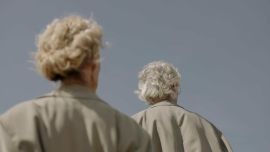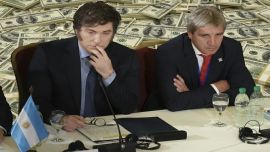Jorge Martín Arturo Argüello, 66, currently serves as Argentina’s ambassador to the United States.
A former national deputy and City lawmaker, who was Argentina's permanent representative to the United Nations from 2007 to 2011, the veteran politician and diplomat is in his second stint as Buenos Aires’ envoy in Washington.
In a feature interview, Argüello analyses the role of the superpowers in current geopolitics, the importance of emerging economies and explains why Argentina, Brazil and Mexico need to be protagonists in the region.
He also touches on the vital opportunity which our country has to transform its productive matrix – if it can overcome the grieta rift.
Does the possibility of conflict between China and the United States exist with Argentina and Latin America having to decide as we return to a bipolar world?
I would say that the most important bilateral relationship on the planet is that between Washington and Beijing. Everything else moves in one direction or the other with greater or lesser intensity depending on that fundamental link. A clear situation of global competition in which the two players move their pieces on all the chessboards simultaneously, all the time.
Latin America is one more scenario of that chess match, we might say, with different readings. There are those who think that we are in the presence of one power on the rise and the other possibly in decline while there are those who think the contrary – that the actions of the rising power will arouse and activate sleeping powers in the supposedly declining power, triggering a reaction which will restore parity to this chessboard of global competition. One thing is for sure, the United States is the world’s leading economic and military power but we don’t know if it will continue to be so and for how long. That will depend on how events develop and on how the scenario is verified.
I’ve been linked to the United States for many years. The first time I presented my ambassadorial credentials in Washington was in 2011 to Barack Obama in the White House. The second time I presented my credentials was to Donald Trump in February, 2020. Now I am continuing that role under the Joe Biden administration. So I’ve seen quite a bit of movement in that country because while I first presented my credentials in 2011, I’ve been living in the United States since 2007.
Beforehand you were ambassador to the United Nations.
I was indeed ambassador to the United Nations for five years in New York. I’ve seen many changes since then, including how the grieta rift has also taken hold of North American society. We need to remember that until a few months before that [2016] election, it seemed impossible that a personality like Donald Trump could win the presidency. I published a book entitled Historia urgente de los Estados Unidos, published eight months before Trump's electoral triumph, and probably the only virtue of that book was to have forecast the tangible possibility of Trump winning those elections! Why? Precisely because of the grieta and the sense of decline being felt by much of North American society, which was needed in a leadership of those singular characteristics, unknown, I would say, until then within the scenario of US domestic politics.
As I was telling you, I presented my credentials to Trump but a year later Joe Biden was governing the United States. My first year was positive, the truth is that relations between Argentina and the United States advanced during the Trump administration in some aspects, in others not so much but it was a mature relationship between two heads of state where my task unfolded normally. Everything was boosted by Biden’s arrival in the White House with the two heads of state rapidly finding personal empathy. The bilateral visits from Argentina to the United States and vice versa began to multiply. I believe that in my second stint I’m going to beat the record for the number of ministerial visits to Washington. That seems important to me because I must say we are in a good moment of the bilateral relationship and I say that with a certain authority as a protagonist in some of the worst moments in the bilateral relationship. Because the truth is that when I had the great honour of representing Argentina in Washington in 2011 and 2012, those were very difficult years for the bilateral relationship.
With Barack Obama in the US presidency and Cristina Fernández de Kirchner governing Argentina in the midst of negotiations with the ‘vulture’ funds, we were subjected to incessant pressures from them. I remember their paid ads against Argentina and the Embassy, published even in the main media, in a permanent harassment to weaken Argentina’s negotiating position while the courts of the World Bank and CIADI [ Spanish acronym for the “International Centre for Settlement of Investment Disputes.”) systematically ruled against Argentina, thus poisoning the air yet further. No bilateral meeting between the US and Argentine presidents could be arranged. I recall that period of my life with great anguish but we have passed from that to the very positive relationship between Argentina and the United States we have now with plenty of trade, consultations and cooperation. There are some differences but we are also very complementary and that may be seen not only in the strictly bilateral relationship but also in the multilateral forums.
Do you see the possibility of the competition between China and the United States escalating into war some day. Remember the prediction that all emerging powers end up in a military dispute with the pre-existing power. Do you assign any chance to that?
Not much of a chance. I’m pretty active in the international field, not only because I’m in Washington representing Argentina but also because I’m the sherpa for President [Alberto] Fernández at the G20. The day before yesterday I had lunch with the Chinese Ambassador to Argentina at his Embassy and that same afternoon I had a very productive meeting with [US Ambassador to Argentina] Marc Stanley at the US Embassy. I do not envisage a scenario of war but rather dispute. When one power is on the rise while the other sees its destiny at stake, the competition for natural resources, for example, is exacerbated. So I see competition, as I said recently, being verified in all the chess-boards and in many of them simultaneously, but I do not visualise a scenario of war.
The switch from fossil fuels to electricity turns lithium into a fundamental element, as well as copper. In times of the oil boom there were a number of wars in the Middle East due to the scarcity of that raw material. Is it possible that this is now repeated in Latin America with disputes developing into war or other forms of aggression due to these scarce raw materials?
Using your words, I would say possibly, not probably in my judgement, but I believe that there will be harsh competition for resources, no doubt about that. I remember myself 11 years ago sitting in my Washington office, explaining via cable TV the phenomenon of shale gas in the United States as a technological process converting an oil importer into an oil exporter. And I remember Argentina taking over the reserves of Vaca Muerta at the start of 2012 during the presidency of Cristina, signing its first agreement with Chevron, a US firm, later that year. As from then I feel that the United States, which, it is true, we might say produces and exports like us, is needing gas supplies, above all the liquified natural gas of Vaca Muerta, because it cannot keep up its deliveries to a Europe which has definitely decided to change its energy matrix. So even if the Ukraine war ends soon, Russia will surely not return to supplying 40 percent of Europe’s gas. I thus feel that a grand scenario has opened up for Argentina to the degree that we are not only capable of extracting the oil and gas from Vaca Muerta but also transporting and converting it into exports.
Ditto for lithium. Argentina has one of the world’s most important reserves of lithium together with Bolivia and Chile, forming what is known as the “lithium triangle.” Argentina has ambitious plans for extraction and we need to add as much value as possible to the lithium from our northern provinces. Two meetings have already been held in Washington, attended by governors of different political parties united by sharing Argentina’s lithium reserves. I’m talking of Gustavo Sáenz from Salta, Gerardo Morales from Jujuy and Raúl Jalil from Mendoza [Editor – sic, actually Catamarca]. We have a permanent work system with them precisely to promote investments into lithium in their respective provinces.
One thing to highlight – Argentina is the main supplier of lithium to the United States as well as increasingly supplying it from China to Europe. So there we have a second major scenario which we must use quickly, both the gas and the lithium, because technological developments advance rapidly and I don’t know if within 10 years lithium will have the strategic importance it has today and nor do I know if gas will continue to be used in 10 or 15 years because that will depend on circumstances. The Ukraine war and the pandemic, for example, have determined that Europe revert to coal and gas, which were being gradually cast aside. Argentina has to react fast and capitalise on what it has, which are precisely its oil, gas and lithium.
You mentioned that at the last G20 summit it was the emerging market troika which was said to take charge for the first time. You underline that India will continue along the same lines. In that sense what does the BRICS invitation to Argentina to join signify?
An important possibility. The Argentine candidacy to join BRICS has been an Indian initiative which is being accompanied by the rest. Don’t be surprised if before this year ends, Argentina is already in the process of incorporating Brics. That will be very important for us because it will broaden our possibilities…
What does it mean for the Malvinas that England no longer belongs to the European Union? Would that 1982 war have turned out differently with Europe neutral, if not on our side?
Probably. The United Kingdom has ceased to belong to the EU but still belongs to NATO. I was recalling that some days ago in a public debate I was reluctantly having with the chairwoman of the Subcommittee on the Western Hemisphere, which covers Latin America, in the US Congress. I reminded her of some imprudent statements she made about Argentina when she spoke of a Chinese base, referring to China’s deep space observatory in the province of Neuquén, about which we can talk if you like. I reminded her that there is no presence.
Not military, anyway.
There is no military power from outside the region in Argentina, save for the British base in the usurped territory of the Malvinas islands. She was referring to this observatory in the province of Neuquén, warranting a public discussion which has not been a characteristic of my work. I have only twice replied in public to statements from US political leaders, both from Florida: first imprudent and gratuitous comments from Senator Marco Rubio and then a fortnight ago from Representative María Elvira Salazar.
You said we might talk about the Chinese observatory. What gives the United States the idea that it has military objectives?
Since my arrival in the United States I would say that I follow the administration as assiduously as I do Congress. I visit them all the time as a product of that prime contradiction which the “China in Patagonia” military base seems to me.
About 18 months ago I decided to travel to Argentina, something which I have never commented in public, and call up Science & Technology Minister Daniel Filmus to tell him: “Daniel, why don’t you organise a public visit to Neuquén to that so-called Chinese base and I’ll go with you but discreetly.” I wanted to have the authority to visit the Space Observatory, opening up all the doors between rooms and desks, filming everything and taking photographs and talking to the Chinese and Argentine workers at this centre because I wanted to speak the truth with authority should an argument arise. I was on the spot and can clearly testify to what I saw, which was that it really was a deep space observatory, as I said recently, with practically the same characteristics as that of the European Union in Malargüe, Mendoza Province. So if they are practically the same, why so much fuss over the Chinese presence and not the European? Because it is China and thus enters into that scheme of competition between Washington and Beijing.
When I entered the base, I had previously read the Americans saying that there were Chinese security forces there. Zero security. There was a doorman from a private security agency jointly contracted by Chinese and Argentine authorities. But the funniest part of the argument which I had with Representative Salazar was when she was saying that Cristina and Alberto were surrendering Argentine sovereignty to China, giving what she called “the base” as her example. Do you know what the giant photograph dominating the entrance to the deep space observatory and flanked by the Chinese and Argentine flags is? A photograph of two heads of state, Xi Jinping and Mauricio Macri. So what is the photo of Macri doing there? It is there because the agreement to install this deep-space observatory came in two stages with the first during the presidency of Cristina Fernández de Kirchner and the second during the Mauricio Macri administration. This station thus definitely expresses something which Argentina is lacking practically across the board – a state policy which continues in different administrations of different political parties. So that formed part of this discussion I was recently having with Representative Salazar.
If the only real military base of a foreign power on the continent is the one on the usurped Malvinas islands, what does scrapping the [2016] Foradori-Duncan agreement signify?
You have used a word permanently denied by the Macri government. He always said: “We are not in the presence of an agreement.” In reality it was an agreement but if any doubt remained on that score, the British Ambassador to Argentina [Kirsty Hayes] last week regretted the collapse of the agreement celebrated between the United Kingdom and Argentina. And why are the semantics so important? Because an agreement of Argentina with another country necessarily presupposes its debate and approval in Congress by the representatives of people and the different political parties there. What did the Macri administration do? It did not send the agreement to Congress but systematically maintained that it was not an agreement but an expression of goodwill without any major legal consequences. But in reality it had consequences for the exploitation of the oil resources and fisheries in the South Atlantic basin, serious consequences. It was an error committed by Argentina which has just now been corrected by the national government, which reverted to the situation prior to this agreement, which in reality was illegal because an agreement of Argentina with a foreign power must pass through Congress and it never did.
You were saying that you cannot imagine what the world will be like when your daughter is 40, can you imagine where we’ll be with the Malvinas in the next 27 years? You chaired the United Nations Special Committee on Decolonisation in 2008. Can you imagine the Malvinas becoming Argentine again via a process of negotiation with UN intervention?
I choose to believe that within three decades the Malvinas will be in the framework of a process of agreement ending up with Argentine sovereignty over the islands.
Something like Hong Kong with China.
We have to be open to exploring different alternatives, always with the objective of regaining sovereignty over the islands. But I believe that “Paris is worth a mass” – we have to exercise our imagination with maturity to find a way permitting the final achievement of our objective. We are not just in the presence of a rhetorical question. We need gestures, audacity, strength of will and consensus to be able to advance in that direction. But I choose to imagine the Malvinas islands in a process of sovereignty transfer which could take a few years or many years but what interests me is to achieve our final objective, which is also mandated by the Constitution.
In that sense does Brexit from the European Union set some precedent for within three decades – Gibraltar?
I think so. As from Brexit the Spanish government has told the EU that any negotiations between Brussels and London must include the Rock of Gibraltar with the Kingdom of Spain as part of those discussions and any agreement. Britain has thus lost some of its strength in relation to the Malvinas question because it was stronger when it could oblige the EU to drag along behind. But today after Brexit that position of strength is relative. We must keep working in that direction.
I’m lobbying in the United States, because, inconceivable as it might seem, we suffer a British veto on our purchase of military equipment anywhere in the world if there is some British component – that permits the United Kingdom to veto the transaction. That’s how a highly important purchase from South Korea fell through. The United States wants to sell us F16s while China wants to sell us equivalent planes, which Argentina needs to patrol the South Atlantic waters. Now I’m telling the US defense secretary: “To the degree you continue to be bound by the potential British veto, any deal goes away by itself.” On the one hand, they are lobbying us to buy their planes but on the other hand, those planes have British components because such aircraft are the product of a complex value chain with many countries intervening in their construction.
We bought 16 jets years ago which we cannot fly because their ejection seats are British, as the ejector seats of most military aircraft worldwide generally are. So we have this absurdity of buying aircraft which we cannot fly because of their British component. We cannot replace them until the ejection seats are past their shelf life and we cannot send a pilot to fly without an ejector seat. That is the importance they have. I’m negotiating on behalf of the Argentine government with the US defense secretary and with Congress for the withdrawal of the United States from this agreement permitting the United Kingdom to veto the acquisition of military materiel with some British component.
Lula was received by Biden immediately after being elected. Is there going to be a meeting between the US and Argentine presidents?
Lula was quickly received by President Biden in Washington in very particular circumstances. Firstly, you have to bear in mind the volume represented by Brazil, secondly the political volume represented by the personality of Lula and thirdly, and that was the determining factor, the symmetry between the invasion of Brasilia and the attempt to storm the US Congress on January 6, 2021.
Or the symmetry between Trump and [Jair] Bolsonaro.
Exactly. There was a rapid identification there and a rapid reaction of the Biden administration. Last year, as a product of various conversations and dealings, they called me from the White House to notify me that President Biden wished to talk with President Fernández, coordinating a time and date. Biden rang up Fernández to tell him, among other things: “President, you and I share a series of definitions of global policy which warrant us meeting up in person to discuss them so I’m ringing you up to invite you to visit the White House. Our ambassadors will take care of the details.” And Fernández did indeed accept the invitation and we took care of the details, setting a date with the bad luck that on the eve of the presidential flight taking Fernández to Washington, our protocol and security advance guard already in Washington rang me up around midnight to inform me that President Biden had contracted Covid-19. The visit was postponed. After the passage of some weeks, a new date was set and President Biden got infected again. Everybody knows and remembers that the entire presidential agenda in the United States was twice suspended because Biden was twice infected with a few weeks of difference …
If you ask me if there will be a visit, I’d say yes, it has not been suspended. I calculate that there will be novelties in coming weeks. I don’t want to keep talking about this question because the truth is that twice already I’ve set up the time, place and date only for circumstances to complicate things.
Might it be that it will not happen because there will be a change of government in Argentina this year while next year there will be elections in the United States?
Yes, the elections do influence … Alberto’s visit to Washington will have to be soon because as the electoral timetable advances, it will be increasingly difficult.
You mentioned the grieta rift several times and Trump emerged from it. How much does theirs resemble ours, how much do the US media, especially Fox (News), have to do with the creation of that polarisation and the unexpected emergence of Trump?
Donald Trump did not trigger that grieta but he himself is a product of the polarisation of US society, a society which is in a process of transformation and profound review. There are two countries, the United States of the coasts and the big cities and another of the inland states which a gut feeling makes you notice when you travel there. I wouldn’t venture to say that the media have triggered the rift either, they also express that process which is piercing US society in a way not very different from various other societies, above all in the Western world.
If you switch on the television and watch Fox, you see one country and if you change to CNN, you see another. And the level of aggression you hear in one channel against the other is terrible. It’s not very different from what we see in some channels in Argentina. So if we Argentines believe that we are world champions of the grieta, I’m sorry to disappoint them and tell them that there are other countries much more important and stabler than ours which are seriously competing with us for the grieta World Cup.
Production: Melody Acosta Rizza and Sol Bacigalupo.





















Comments